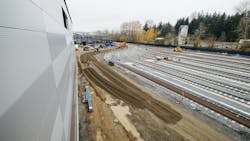Sound Transit hits pause on expansion construction
Sound Transit has directed its contractors to suspend construction work, with limited exceptions, from April 6 to May 4, citing risks associated with the spread of COVID-19.
Washington Gov. Jay Inslee extended the state’s Stay Home, Stay Healthy initiative through May 4 last week, which discourages non-essential travel and non-essential contact.
Sound Transit says the decision was made following careful evaluation of what heightened measures would be necessary to ensure the safety of the construction workforce and whether contractors are prepared to take those measures.
The agency said the construction activities that will continue involve tasks considered to be critical or necessary to ensure safety or to avoid mobility, environmental or other impacts. However, Sound Transit explains it will immediately shut down work if contractors are unable to comply fully with safety plans.
Additional critical work that will continue includes utility work already in progress at various locations that will be completed; work in the streets of the Tacoma Stadium District that is highly disruptive to the public; certain sidewalks, ramps and driveways on the Eastside, which are important for the safe passage of pedestrian and vehicular traffic; demolition of buildings along the Federal Way alignment that would pose a public health or safety concern if left standing; and fire protection systems work in the I-90 Mount Baker Tunnel.
This work will progress under additional safety measures such as reducing work crew sizes, staggering report times to avoid large groups, adding sanitation facilities including more hand washing and hand sanitizer stations, using face shields, screening of employee wellness by first line supervisors upon reporting to the site and an emphasis of COVID-19 symptom recognition, personal protective measures, personal protective equipment and revised work practices.
Sound Transit will be reallocating safety inspection and construction management resources from closed sites to those sites that remain active. Contractors will continue to monitor security at worksites and to maintain the sites, including environmental protection measures. Additionally, the agency expects that construction personnel assigned to construction sites that remain active will continue to work on a voluntary basis.
Sound Transit says it will monitor the circumstances surrounding each project and continue to work closely with appropriate authorities to determine if the construction stop period should be extended or decreased.
About the Author

Mischa Wanek-Libman
Group Editorial Director
Mischa Wanek-Libman is director of communications with Transdev North America. She has more than 20 years of experience working in the transportation industry covering construction projects, engineering challenges, transit and rail operations and best practices.
Wanek-Libman has held top editorial positions at freight rail and public transportation business-to-business publications including as editor-in-chief and editorial director of Mass Transit from 2018-2024. She has been recognized for editorial excellence through her individual work, as well as for collaborative content.
She is an active member of the American Public Transportation Association's Marketing and Communications Committee and served 14 years as a Board Observer on the National Railroad Construction and Maintenance Association (NRC) Board of Directors.
She is a graduate of Drake University in Des Moines, Iowa, where she earned a Bachelor of Arts degree in Journalism and Mass Communication.

